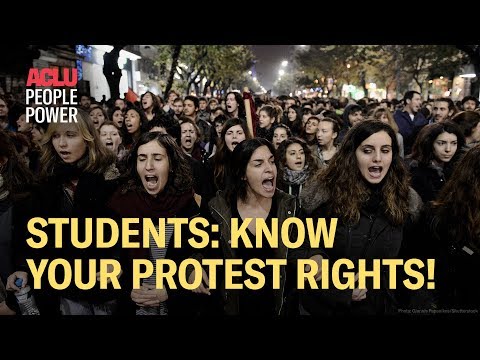
Freedom of speech protects your right to express your ideas and beliefs how you choose. This includes what you say and write. It includes protests, organizing and joining others.
- Do I have the right to freedom of speech at school?
YES. You do not lose this right at school or because you are a student.
- Can the school limit my speech?
SOMETIMES, but only if your expression causes a substantial disruption at school or infringes on the rights of others. You school’s code of conduct must include an explanation of your free speech rights and responsibilities and any relevant policies.
Substantial disruptions interfere with the operation of the school or involve violations of laws or school rules.
Speech infringes on others’ rights when it substantially interferes with their education, physical or mental health; threatens or intimidates; falsely harms reputations; or is vulgar or obscene.
- What can I do if my school tries to limit my speech?
Ask for a copy of the applicable rules and an explanation as to why it wants to ban your expression. If your school thinks your speech is substantially disruptive or infringes on others’ rights, it may censor you. You may have to go to court to get a final decision.
- Where can I protest?
School, if peaceful and consistent with school rules. Check your school code of conduct for policies on student speech. Protests during lunch or before or after school are unlikely to be disruptive.
Public forums, including streets, sidewalks and parks.
- Do I need a permit to protest?
Maybe, if your protest blocks traffic, uses amplifiers or is at certain parks or facilities.
No, if you stay on sidewalks, obey traffic rules and do not block pedestrian movement.
- Can the school discipline me for protesting?
Maybe. You may be disciplined if you break a school rule, but only to the same degree you would be punished without the protest. For example, if you walk out, you may be disciplined in the same way the school disciplines students skipping school. You may not be suspended for an unexcused absence. The exact punishment you could face will vary by your state, school district, and school. Find out more by reading the policies of your school and school district. If you’re planning to miss a class or two, look at the policy for unexcused absences. If you’re considering missing several days, read about truancy. And either way, take a look at the policy for suspensions. In some states and districts, suspension is not an available punishment for unexcused absences. And nationwide, if you are facing a suspension of 10 days or more, you have a right to a formal process and can be represented by a lawyer. Some states and school districts require a formal process for fewer days, too. Also, you should be given the same right to make up work just as any other student who missed classes.Find out the rules so you can tell if they are being applied differently when it comes to your walkout.
-
What about protesting away from school?
Outside of school, you enjoy essentially the same rights to protest and speak out as anyone else. This means you’re likely to be most protected if you organize, protest, and advocate for your views off campus and outside of school hours.
-
What are my rights on social media?
You have the right to speak your mind on social media. Your school cannot punish you for content you post off campus and outside of school hours that does not relate to school. Some schools have attempted to extend their power to punish students even for off-campus, online posts. While courts have differed on the constitutionality of those punishments, the ACLU has challenged such overreach.
We’d love to know how your school, and schools around the country, are responding to your walkout. Let us know here.
Other Resources
-
Students: Know Your Rights! Presentation
Students around the country are turning the heartbreaking school shooting in Parkland, Florida, into an inspiring push for change. Plans for coordinated student walkouts have been making national news and have already spurred disciplinary threats from some school administrators. Read more...
-
Students’ Free Speech Rights in Public Schools
If you’re a public school student, you don’t check your constitutional rights at the schoolhouse doors. But whether schools can punish you for speaking out depends on when, where, and how you decide to express yourself. Read more...
- Can Schools Discipline Students for Protesting?
Students around the country have turned the school shooting in Parkland, Florida, into an exemplary push for change. Here's a quick primer on their protest rights. Read more...
- Student Rights at School: Six Things You Need To Know
While the Constitution protects the rights of students at school, many school officials are unaware of students’ legal protections. Here is what students should know about their rights in schools with regards to dress codes, LGBT and pregnancy discrimination, and more. Read more...
- Tinker v. Des Moines
In 1965, Mary Beth Tinker was a 13-year-old who decided to wear a black armband to school to protest the war in Vietnam. That decision led to a landmark Supreme Court decision. Read more...
- Speech on Campus
Restrictions on speech by public colleges and universities amount to government censorship, in violation of the Constitution. Read more...







